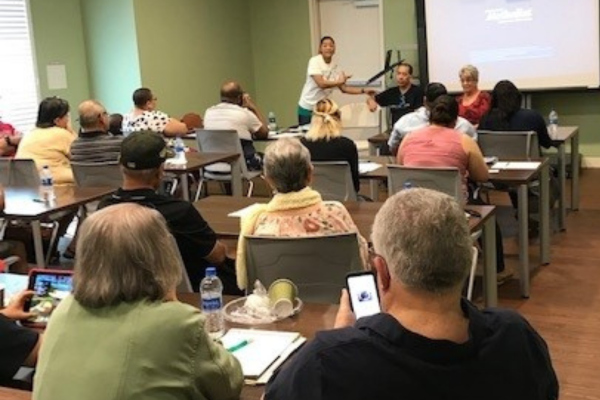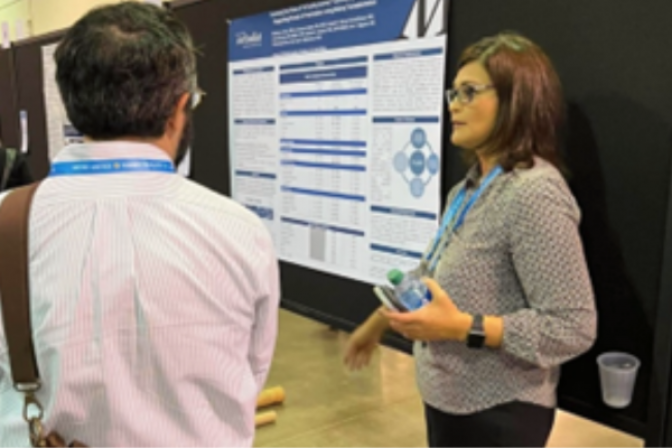In South Carolina, the battle against kidney disease is not only against diabetes and high blood pressure–the two biggest risk factors. It's also about the barriers ...
Turning Hurdles into Hope: How one Hospital Overcomes Kidney Transplant Obstacles
- English
- Español
January 04, 2024, 8:14am EST
Housing instability, language barriers, and finances. These social factors, among others, often block someone’s access to a kidney transplant. Houston Methodist Hospital is on a mission to help people overcome these barriers with education, living kidney donations, and preemptive transplants.
Bethany Cruz, Outreach Coordinator at Houston Methodist, explains just how they do it.
Social determinants of health in kidney transplants
“I do dialysis-side education. I teach people about transplants during treatment so they don’t need to make a separate appointment,” said Cruz. “It’s an honor to be one of the first people patients talk to about transplantation. With education and confidence, many go on to get a kidney transplant. The joy of seeing their lives transformed has kept me in the field for thirteen years and I don't plan on leaving soon.”
Why does this approach work?
“We create trust when we sit and talk. With trust, people may feel more comfortable opening up about their life and struggles.” Cruz said, “It gives people space to ask questions they may not want to ask in a lobby full of people.”
The conversations help Cruz discover if someone is facing barriers to transplantation. These barriers may include social determinants of health, which are factors that can make it harder to live a healthy life and get proper medical care.
“Many things affect someone’s access to kidney transplantation. It could be a lack of transportation, finances, language, or insurance. Others don’t have a support system. Many of those experiencing these issues are people of color. As a Hispanic woman, I can relate to these people. Our education is also provided in English and Spanish,” said Cruz. “We teach people that transplants are not for a select group of people. They are for everyone.”
Other social determinants of health include:
- Food insecurity
- Housing instability
- Inadequate access to utilities like electricity, internet, or phone
- Poor income
- Lack of employment opportunities
Want to help NKF fight for a world where everyone has equal access to kidney care? Become a Voices for Kidney Health advocate. Your story and passion is what creates change in government and across the nation.
Reducing disparities through education
Once Cruz learns what is stopping someone from getting a transplant, she helps craft solutions.
“We encourage people to think outside of the box. Go to church? Part of a community activity? You may find someone within these communities to be a caretaker, a supporter, or a donor. You’d be surprised how many people are willing to help. We want everyone to think outside the nuclear family,” said Cruz. “We also talk about social programs, local services, or insurance resources that could help.”
The education doesn’t stop there. Cruz teaches healthcare providers about the importance of preemptive kidney transplants.
“Many people, even professionals, think you have to have kidney failure to get a transplant. That isn’t true. You can get a transplant before dialysis." Cruz said, "We work with community partners and nephrologists to spread the word. Most patients do much better when they have not been exposed to dialysis."
Benefits of a preemptive transplant include:
- Less risk of kidney rejection
- A longer, higher quality life
- Avoiding dialysis-related health complications
Don't wait. Take “First Steps to Transplant” to learn how to navigate the kidney transplant system.
Expanding donor options

The average wait time for a kidney is 3 to 5 years and even much longer in some parts of the country. Around 12 people on dialysis die each day while waiting for their second chance at life. Houston Methodist’s living kidney donor program was designed to help people circumnavigate the long wait.
“We focus on living kidney donation. We teach people how to share their story using social media, print marketing, and word of mouth.” Cruz said, “We also dispel common myths surrounding transplantation.”
Many people think donating a kidney is dangerous and can negatively impact their loved ones. Cruz educates them about the facts and that transplant is a relatively safe option. It’s possible to live a long, healthy life with one kidney.
“Another myth is that the living donor has to be a brother, sister, or parent,” Cruz said. “You don’t need a blood relative to donate because paired exchange programs exist where two pairs of donors “swap” recipients.”
The hard work is paying off–Houston Methodist performs around 200 kidney transplants a year. Incredibly, half are from living donations. That’s 100 people who spent less time on the transplant waiting list. That’s 100 people who gave the gift of life.
“We see great success with living donations and you can too. Share your story. You never know who is listening. Someone you may not know could decide to donate. Altruistic donors, people who don’t know who they are donating to, are the crux of living donation. They’ve set off so many kidney donation chains.” Cruz said, “Don’t be afraid to put yourself out there. You are much more likely to receive a transplant by opening up than by staying silent.”
Interested in learning more about living donation? The NKF Kidney Learning Center can help. Join now to learn how to find a living donor or become one yourself.
Related content
According to the National Institute of Diabetes and Digestive and Kidney Disease (NIDDK), the VA currently cares for around 600,000 Veterans with kidney disease, 40...

